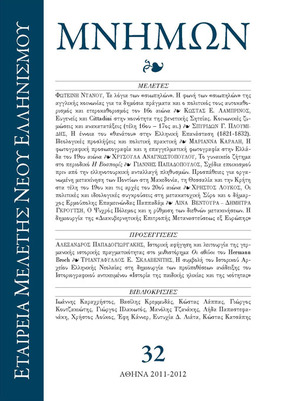Η έννοια του «θανάτου» στην Ελληνική Επανάσταση (1821-1832) : Ιδεολογικές προσλήψεις και πολιτική πρακτική
Part of : Μνήμων ; Vol.32, 2012, pages 59-88
Issue:
Pages:
59-88
Parallel Title:
The notion of ‘death’ in the Greek Revolution (1821- 1832) : Ideological perceptions and political practice
Section Title:
Articles
Abstract:
The evolution of Greek nationalist ideas signified the passage from patria to the nation. The eruption of the revolution influenced the way the Greeks perceived the notion of ‘death’. Since, the struggle for independence was massive, death also became collective. The Greek revolutionaries claimed that the Sultan was intent on slaughtering the entirety of the Greek nation. This was not true, yet the death toll of the Greek Revolution exceeded the traditional limits of earlier Christian rebellions, and the number of dead is estimated between 230,000 and 600,000. Massacres occurred beyond the limits of the Peloponnese (in Constantinople, Smyrna, Chios at el.), and every Greek-speaking Orthodox individual became a potential victim of the revengeful Ottomans. The Ottoman atrocities drew the imaginary geographical boundaries of the Greek ‘national’ space. Nevertheless, Greeks were not the only victims of the War of Independence. By 1833, around 63.000 Muslims (‘Turks’) were either killed or expelled from the territory of the Greek state. Vengeance and hatred against the ‘Turks’ was a tenet of the Greek revolutionary agenda. In addition to its new collective nature, the notion of ‘death’ acquired during the Greek Revolution a new, political meaning. Koraes and Rigas had already prepared the ground for the grounding of their fellow-Greeks in this new perception. ‘Death’ came to describe ‘slavery’, ‘tyranny’, ‘oligarchy’ and submission to the ‘Turks’. Natural death came to be seen as preferable to a meaningless life without Koraes’ ‘natural rights’ (equality, rule of law, etc.). To this end, the Third National Assembly of the Greeks pronounced in 1827 the notion of ‘political death’. The term ‘death’ in the revolutionary motto ‘Freedom or Death’ (Ελευθερία ή Θάνατος), which drew on the French maxim La Liberté ou la Mort, had by and large this political significance. The determination of the Greek revolutionaries to achieve freedoms and rights at the cost of their life is found in several official declarations and statements. General Spyromilios clarified that (life or) ‘death’ was hence forward a matter of ‘national existence’ and not of ‘personal existence’, i.e. it was primarily a collective and political issue. This ideological development was an outcome of secularization. Secular freedom was deemed to be hierarchically a superior value to the religious tolerance, which the Orthodox enjoyed within the Ottoman millet system. For that matter, the attainment of independence in 1830 was hailed by the protagonists as the ‘resurrection’ of the Greek nation.
Subject:
Subject (LC):




